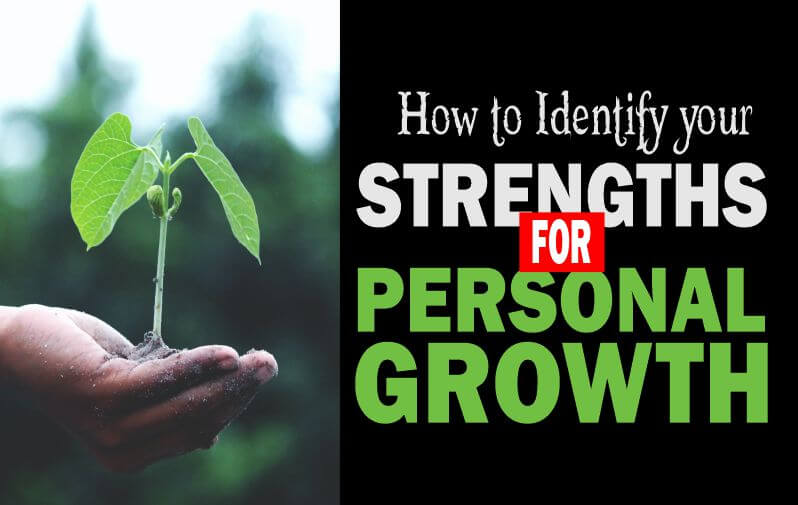In a society where competition is rife and the rat race gnawing at you, knowing how to identify your strengths for personal growth becomes important.
Everyone has got what they can be good at depending on their strengths.
However, people often find it difficult to identify their strengths and confidently chart the course of their lives.
Knowing and fully utilizing your strengths can be the key to achieving success in your personal and professional life.
Identifying your strengths can help you hone your skills, set appropriate goals, improve your self-confidence, and make career or life decisions that play to your strengths.
So, how do you identify your strengths?
This article is going to clearly address the above question so that at the end you would have known how to identify your strengths for personal growth both in your personal and professional life.
What is Strength for Personal Growth?
Strength for personal growth is the ability to overcome obstacles and challenges in order to make progress towards achieving your goals and becoming the best version of yourself.
This strength is a combination of thought patterns, actions, patience, persistence, resilience, and other personality traits that interplay to make an individual wade through life’s difficulties.
It involves having the courage to face your fears and vulnerabilities and learning from your mistakes and failures.
Personal growth requires self-knowledge and the willingness to take responsibility for your actions and choices.
Strength for personal growth also involves having a growth mindset – the belief that talents and abilities can be developed through hard work, effort, and perseverance.
This mindset promotes a desire for continuous learning and improvement.
When you identify your strength for personal growth, you gain a greater sense of purpose, direction, and self-confidence.
Also, you are better equipped to navigate life’s challenges and embrace new opportunities.
Ultimately, your personal strength enables you to live an authentic and fulfilling life. This is why it is valuable to identify your strengths for personal growth.
Differentiating between Skills and Strength

Skills are the abilities that you have acquired through learning and practice.
They are specific techniques and knowledge that are developed through training, education, and experience.
Examples of skills include writing, public speaking, programming, or playing an instrument.
On the other hand, strength refers to a person’s inherent qualities and characteristics that they possess naturally.
Strengths are typically harder to develop than skills and are more likely to be innate.
Examples of strengths could include empathy, adaptability, perseverance, or creativity.
To put it succinctly, skills are acquired through learning and experience, while strengths are qualities that are inherent to a person’s character.
Also Read: Life Mastery and How to Achieve it
Popular Misconceptions about Strengths for Personal Growth
Strength for personal growth just like every other trait can be misconceived and misrepresented.
It is important to recognize that strength can look different for everyone and doesn’t necessarily conform to a stereotypical image.
True strength is often about resilience, adaptability, and a willingness to learn and grow.
Here are some of the popular misconceptions about strength for personal growth:
- Strength means not showing vulnerability: True strength comes from being secure enough in oneself to show vulnerability and ask for help or support when needed.
- Strength is only physical: While physical strength can be important, there are many types of strength, including emotional, mental, and spiritual strength.
- Strength is innate: Strength can be developed and cultivated through practice and perseverance, just like any other skill.
- Strength means never giving up: While perseverance is important, there are times when knowing when to let go of something can be a sign of strength.
- Strength is an individual trait: Strength often comes from our connections and relationships with others, and being able to lean on those connections for support is a sign of strength.
Related: Roadblocks to Self Mastery and How to Overcome
Importance and Benefits of Identifying Your Strengths

Knowing how to identify your strengths for personal growth is sacrosanct for anybody who wants to go past the mediocre or average life or what I call the adrift life.
Naturally, you will find yourself settling at the very bottom of life when you drift along and refuse to affect things and tuck at the universe for favour.
Here is the importance of discovering your strengths and applying them in your personal growth:
- Self-awareness: When you identify your strengths, you gain a better understanding of yourself. You become more aware of what you excel at and the areas where you need to improve. This self-awareness can help you make better decisions and achieve your goals more effectively.
- Career development: Knowing your strengths can help you make informed decisions about your career. It can help you choose a career that aligns with your strengths and abilities. This can lead to greater job satisfaction and improved performance.
- Personal development: Identifying your strengths can also help you develop your personal skills and abilities. You can use your strengths to develop your weaknesses and become a more well-rounded individual.
- Increased confidence: Knowing your strengths can boost your confidence and self-esteem. It can help you feel more empowered to take on new challenges and pursue your goals more confidently.
- Improved relationships: When you know your strengths, you can communicate them more effectively to others. This can help you build stronger relationships and work more effectively with others.
Related: Expert Tips on Making Your Career Decisions
Identifying Your Strengths for Personal Growth

Just as described in the introduction of this article, personal growth is a continuous process of exploring and developing your strengths, weaknesses, goals, and values.
Knowing how to identify your strengths can help you discover and pursue your passions, build your confidence, improve your relationships, and enhance your career prospects.
Here are effective ways to identify your strengths:
1. Take a Personality Test
Taking a personality test can be a helpful way to identify your strengths and weaknesses, which can then be used to guide you towards success.
Personality tests are designed to measure different aspects of your character, such as your interpersonal skills, your creativity, your emotional literacy, and your ability to handle stress and change.
By understanding your unique personality traits, you can better understand how to work effectively with others, communicate your ideas, make important decisions, and cope with challenges.
2. Reflect on Your Achievements
Reflecting on your achievements is a powerful way to identify strengths that can be leveraged for personal growth.
By taking the time to look back on what you have accomplished, you are able to recognize patterns of success and understand what you are capable of.
This allows you to gain confidence in your abilities and become more self-aware, which is essential for personal growth.
When you reflect on your achievements, you also gain insights into what drives and motivates you.
You can identify the things that you enjoy doing and that makes you feel fulfilled, as well as the areas in which you excel.
3. Ask for Feedback
Asking for feedback is an important tool that helps to identify your strengths for personal growth.
By seeking feedback, you can gain insights into your strengths from others, which can help you identify areas where you can focus your efforts.
For example, if you are good at communication, you can focus on improving your communication skills to become a more effective communicator in personal and professional settings.
Asking for feedback can also provide you with a broader perspective as you receive feedback from different people with different experiences.
Receiving feedback from multiple sources will give you a comprehensive understanding of your strengths, which can assist you in identifying patterns of behavior that contribute to your success.
4. Practice Self-awareness
Practicing self-awareness has to do with paying attention to your thinking, feelings, and behaviours so they are not driven by instincts.
By becoming more self-aware, you can identify your strengths and weaknesses more easily.
This knowledge of strengths and weaknesses can be used to identify areas where personal growth is needed.
For example, if someone identifies that they are an excellent public speaker during a self-awareness exercise, they can use this strength as a basis for personal growth.
They can seek out opportunities to speak in public, take courses on public speaking, and work on building their skills to become even better.
5. Try New Things

Trying out new commitments, hobbies, and activities can help you discover areas where you excel naturally.
When you engage in a new task or venture in a new direction, you may find strengths that you never knew you had.
Once you’ve identified your strengths, it’s crucial to leverage them by applying them to your everyday life.
Trying new things also exposes you to different experiences and perspectives, which can broaden your understanding and knowledge.
This can lead to personal growth and development by expanding your mindset and encouraging continuous learning.
Keep in mind that personal growth is a lifelong journey, and it’s essential to continue to self-reflect and continuously identify your strengths as you move through different stages of your life.
Suggested: Why You Must Overcome Negative Self-talk
Examples of Strengths for Personal Growth
Strengths that quicken personal growth can come in different forms depending on where your passion lies, while others are universal and are necessary for every interest.
Here are examples of strengths that can help you hone your personal growth:
- Self-awareness: Being aware of your emotions, thoughts, and behaviors can help you understand your strengths and weaknesses. This allows you to identify areas of personal growth and develop strategies for self-improvement.
- Perseverance: Having a strong sense of determination and perseverance can help you overcome challenges and setbacks. This strength also helps you maintain a positive attitude and stay focused on your goals.
- Empathy: Being able to understand and connect with others on an emotional level can help you build relationships and communicate effectively. This strength can also increase your emotional intelligence and help you develop a more compassionate attitude towards others.
- Creativity: Thinking outside the box and coming up with innovative ideas can help you solve problems and develop new skills. This strength also allows you to embrace change and adapt to new situations.
- Resilience: Being able to bounce back from adversity and learn from your experiences is a key strength for personal growth. This can help you develop a growth mindset and improve your emotional and mental wellness.
- Responsibility: Being accountable for your actions and decisions helps you develop a sense of responsibility and maturity. This strength also helps you prioritize your tasks and commitments, and build trust with others.
- Time management: Effective time management helps individuals prioritize tasks, reduce stress, and increase productivity. It allows for better use of resources, including time for personal growth and development. With good time management skills, individuals can achieve their goals and lead a fulfilling life.
Commonly Valued Strengths in the Workplace
Commonly valued strengths in the workplace are the set of skills, abilities, and personal qualities that employers and colleagues appreciate and respect.
These may include communication skills, leadership abilities, teamwork and collaboration, problem-solving, initiative, adaptability, time management, creativity, and critical thinking.
This set of strengths ensures good performance and can make an employee in the good books of the management while also opening new opportunities.
How Certain Strengths Are Useful for Success in Specific Fields
Just as mentioned, different fields require different sets of strengths though there are universal strengths that seem to be crucial in every field.
For instance, in a sales-related occupation, having strong communication and persuasion skills is essential.
In engineering, problem-solving and critical thinking are highly valued, while in the healthcare sector, patience and empathy are critical attributes.
In the management sector, the ability to lead, collaborate and inspire others is vital.
Wherever one finds oneself, the specific strengths that will guarantee success are supposed to be acquired and personalized.
How to Leverage Your Unique Strengths
To leverage your unique strengths, you must identify them first.
Observing your personal and professional experiences, asking for feedback from colleagues’ supervisors and mentors, and taking personality assessments may help identify your strengths.
After that, find ways to integrate them into your work, such as organizing to utilize your multitasking abilities, developing your interpersonal skills, or focusing on your creativity.
Also, you should communicate your unique strengths to your supervisors and use them to take on challenging projects and assignments.
Putting Your Strengths into Action
Putting your strengths into action means identifying your natural abilities and developing them intentionally.
It has everything to do with understanding your unique skills and talents and using them to achieve your goals and fulfill your purpose.
By focusing on your strengths, you can increase your confidence, productivity, and overall success.
Here’s how to achieve that:
1. Incorporating Your Strengths into Your Daily Routine
Incorporating your strengths into your daily routine means recognizing and utilizing your natural abilities and skills in your daily activities.
This can not only lead to greater satisfaction and productivity but can also help you achieve your goals more effectively.
One way to incorporate your strengths is to identify your personal strengths through self-reflection or assessments.
These strengths as we have already discussed include traits such as creativity, communication skills, or attention to detail.
2. Utilizing Your Strengths in Your Career or Personal Life
In your career, you can utilize your strengths by seeking out job opportunities that align with your strengths.
Once you are in a job, you can ask for assignments or projects that allow you to use your strengths.
In your personal life, you can utilize your strengths to improve your relationships and overall well-being.
If your strength is empathy, you can use this to be a supportive friend or family member.
If your strength is creativity, you can use this to pursue hobbies or interests that allow you to express yourself.
3. Overcoming Limitations and Barriers Using Your Strengths
Overcoming limitations and barriers is an essential way to put your strengths into action.
When you encounter obstacles or challenges, it can become easy to feel disheartened and give up.
However, instead of allowing limitations and barriers to stop you, it’s important to view them as opportunities to leverage your strengths and find creative solutions to problems.
Conclusion
Knowing how to identify your strengths for personal growth is the first step towards creating a life of success.
When you understand what you excel at and what you enjoy doing, you can direct your energy towards areas that bring you joy and fulfillment.
Furthermore, it allows you to leverage those strengths, whether in your professional or personal life, to achieve your goals.
To identify your strengths, you should consider gathering feedback from others, reflecting on your past successes and failures, and conducting self-assessments.
Once you have identified your strengths, it is essential to develop them further and use them to your advantage.
Certainly, understanding your strengths will help you become more self-aware and focused, leading to greater success in your personal growth.
References:
- 5 ways to find out what your strengths are
- How to Identify Your Strengths and Weaknesses
- Five Ways to Identify Your Personal Strengths at Work
- Five Steps to Assess Your Strengths
- 5 Steps to Find Your Strengths in Life
Pyo Merez (PsyD) is a distinguished adolescent and adult psychologist at the forefront of mental health advocacy.
With expertise in cognitive and developmental psychology, focusing on social relationships, cultural contexts, and individual differences, Pyo has dedicated his career to empowering adolescents and adults.
As a sought-after speaker and panelist, Pyo shares invaluable insights on issues affecting young people, contributing to a deeper understanding of mental health and well-being in today's society.

